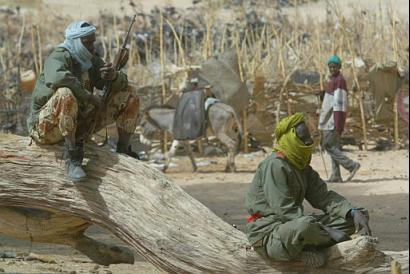Sudanese official says rebels suffer heavy losses as military bombs rebel camps along the border with Chad

By ANDREW ENGLAND Associated Press Writer
KHARTOUM, Sudan, Jan 27, 2004 (AP) — A senior Sudanese government official said Tuesday that rebel groups fighting in western Sudan had suffered heavy losses as the military bombarded rebel camps in the region in a bid to crush the insurgency.
Gutbi el-Mahdi, President Omar el-Bashir’s political adviser, denied rebel accusations that the government was targeting civilians, but said the government was bombing four rebel camps in Darfur, an impoverished region that borders Chad. He told The Associated Press that the rebels had suffered “a lot of losses.”
Reporters in the region heard loud explosions Tuesday as planes circled overhead the border town of Tine; el-Mahdi said there was a rebel camp in Tine on the Sudanese side of the border.
Refugees fleeing into Chad have said their villages were destroyed by bombs and raids by Arab militia. They accuse government forces of practicing a scorched earth policy in fighting the insurgency.
The U.N. refugee agency said Tuesday that it was registering thousands of newly arrived refugees along the Chad-Sudan border. Refugees from the village of Habila told U.N. officials that a large aircraft and helicopters bombed their homes 10 days ago. Armed men then entered the village on horses and camels, stealing cattle and chasing people away, the refugees said.
Two rebel groups – the Sudan Liberation Army and the Justice and Equality Movement – have been fighting the government since early last year. U.N. agencies say more than 600,000 thousand people have fled their homes because of the violence and some 95,000 of those have crossed into Chad.
El-Mahdi said the government was isolating the rebels and talking to community leaders to solve the region’s problems. He said the rebels were making unreasonable demands.
“In the beginning they made some success, we had an agreement, but when the politicians started to use the situation, things changed and the talks broke down,” el-Mahdi said. “So the government felt its responsibility, number one, is to maintain order in the country, and second, it is to try to solve the problem on a political level.”
He said the rebels’ new demands included self-determination for Darfur and a large share of Sudan’s oil wealth. Their earlier demands – “mainly services, development in the region, securing the villages” – were very reasonable, he said.
The rebels, however, say they are fighting for an equal share of the nation’s wealth and greater political representation, not self-determination.
Zakaria Mohammed Ali, secretary-general of the Justice and Equality Movement the government wanted to deal with the rebellion as a “security problem,” not a political issue.
“The people in the central government do not want power and economic sharing, this is our issue,” Ali said by telephone.
It was not immediately possible to talk to SLA leaders.
The insurgency in Darfur has worsened as talks between the main southern rebel group and the government have inched forward to end that war, with the government agreeing to a wealth-sharing deal with the south. Opposition politicians say the deal between the south and the government could aggravate unrest in other areas that feel marginalized.
